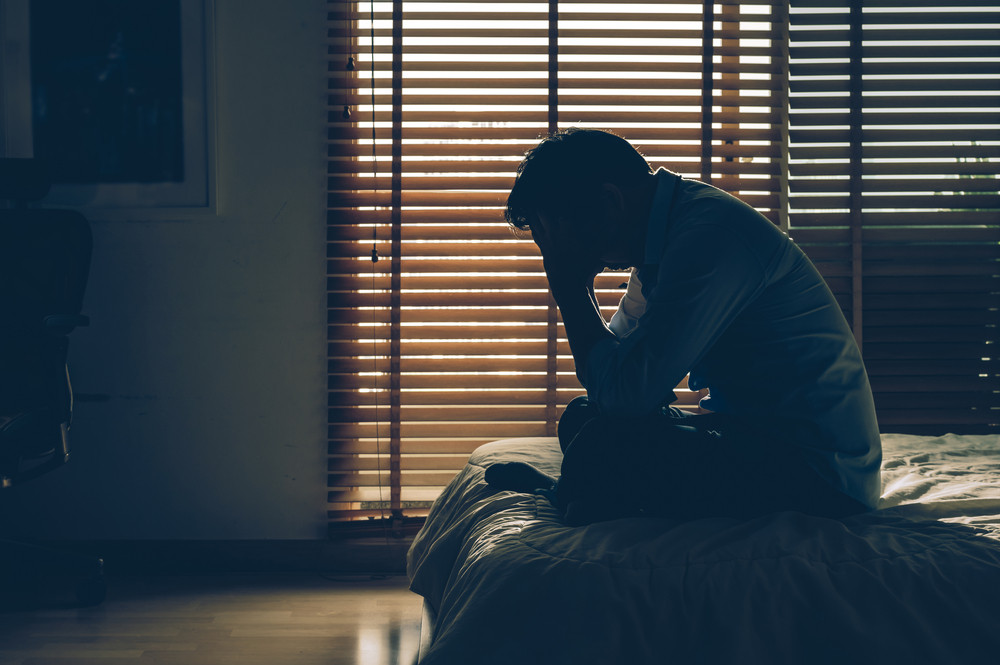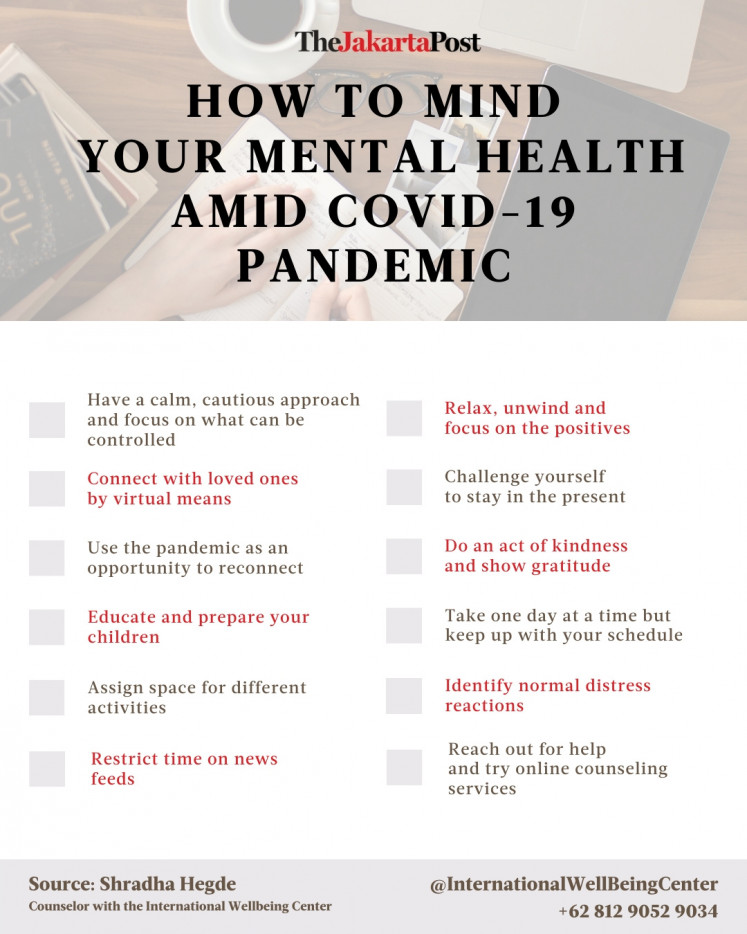Popular Reads
Top Results
Can't find what you're looking for?
View all search resultsPopular Reads
Top Results
Can't find what you're looking for?
View all search resultsStay safe, stay sane: How to mind your mental health amid COVID-19 pandemic
Here are a few things that can help us establish new routines and make physical distancing easier.
Change text size
Gift Premium Articles
to Anyone
T
he world is currently struggling under a pandemic. The COVID-19 coronavirus appears to be the main topic of discussion, the racing thought at the back of our minds, disrupting our plans and routines. These are normal responses during a crisis.
Here are a few things that can help us establish new routines and make physical distancing easier.
1. Have a calm, cautious approach and focus on what can be controlled
Taking care of your physical health by being mindful of personal and environmental hygiene can bring mental composure. What can be controlled here is the stocking of essentials like medications, basic food for two to three weeks, staying indoors and maintaining physical distance.
2. Connect with loved ones by virtual means
Stay connected with family, friends and colleagues. Call your family and friends, check on elderly parents and relatives to make them feel cared for. Being a part of a WhatsApp community group can also create a strong feeling of association.
3. Use the pandemic as an opportunity to reconnect
Staying home is the safest way to keep yourself away from the virus. Instead of feeling stuck at home, we can view it as an opportunity to spend time with family by opening old photo albums and reminiscing over fond memories.
4. Educate and prepare your children
Educate and prepare children for this pandemic and the reasons for their limited outdoor activities. Offer help with their home-based learning assignments. Try to engage children by involving them in small household chores.
5. Assign space for different activities
Use corners of the house with minimal distractions for work-related tasks. Use the couch for relaxing and the bed for resting and sleeping. Remember to utilize home spaces.
6. Restrict time on news feeds
Too much information can be overwhelming, as hoaxes and negative news can make you feel worse. Limit yourself to a few minutes of information every day to keep yourself updated, as well as to avoid information fatigue.
How to mind your mental health amid COVID-19 pandemic (JP/File)7. Relax, unwind and focus on the positives
Listen to your favorite music, watch an old movie, read a book, enjoy a meal of your choice, walk under the sun while keeping a safe distance or do yoga. Celebrate your small achievements. It could be as simple as decluttering your closet.
8. Challenge yourself to stay in the present
If you are caught with thoughts about coronavirus at all times, try to bring yourself to the present by noticing and naming what you see, hear and taste. This can help relieve your anxieties.
9. Do an act of kindness and show gratitude
Helping people will make you feel good. It could take the form of ordering from small local businesses or showing gratitude to the medical staff who work relentlessly for our wellbeing.
10. Take one day at a time but keep up with your schedule
Short plans are effective and fulfilling. Start by prioritizing the top three tasks for the day to reduce feelings of frustration. Savor time-saving activities like enjoying breakfast without any rush.
11. Identify normal distress reactions
Beware of feeling scared, disturbed sleep, worrisome thoughts, trouble focusing, feeling low and restlessness. Moments of irresolution are common reactions during a global crisis.
12. Reach out for help and try online counseling services
If you or your loved ones are undergoing periods of depression, anxiety, panic and stress, please reach out to professionals. It should not be taken lightly as stress can reduce your body’s immune system. If there is any pre-existing mental health condition, please continue your therapy treatment.
Actively manage your wellbeing by understanding the nature of this pandemic and give yourself and others time for fine tuning during physical distancing. Doing the aforementioned steps can make the process easier.
Remember to safeguard interests of self and community. If you think you or your loved ones need help, do not wait until you are on the brink of breaking down; seek help right away. It will help you during the ongoing crisis. (wng)
***
The writer is a counselor at the International Wellbeing Center (IWC). The IWC offers online counseling and is currently offering special rates to help people during the COVID-19 pandemic.












